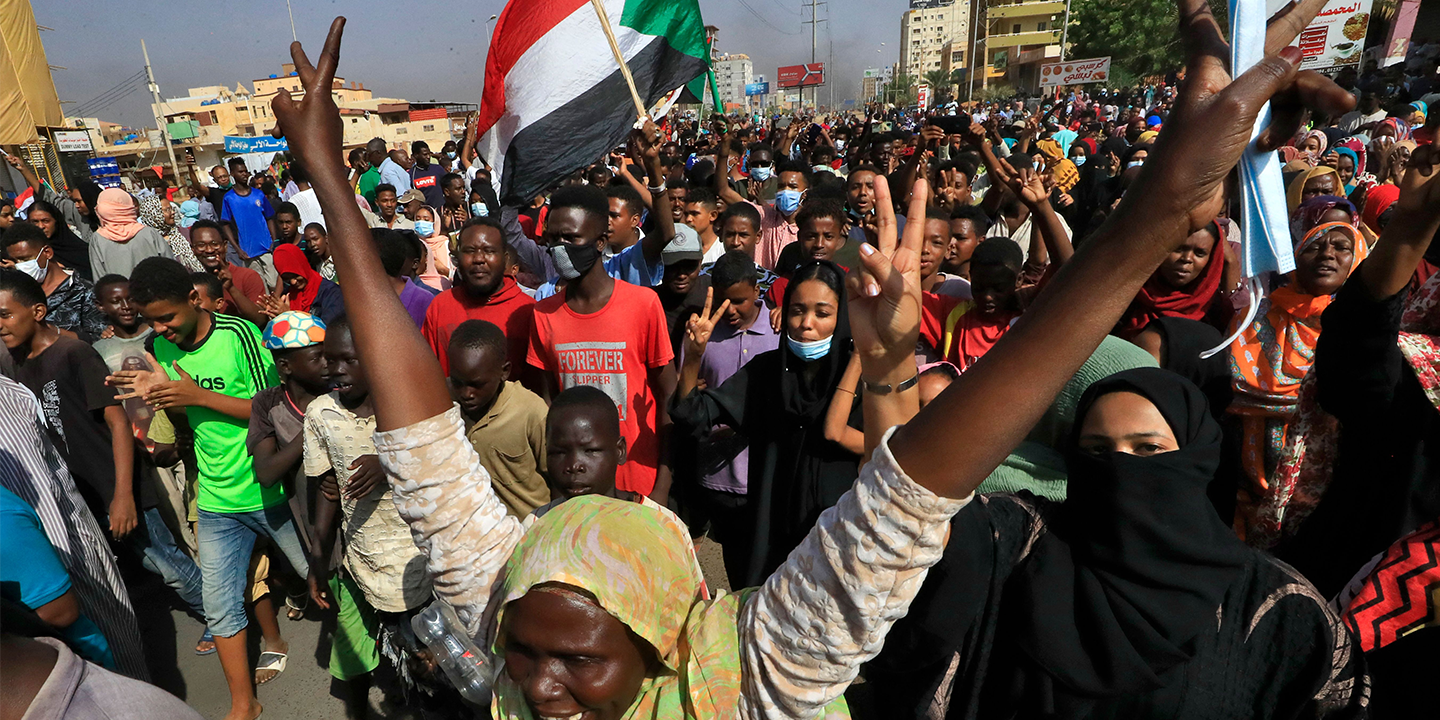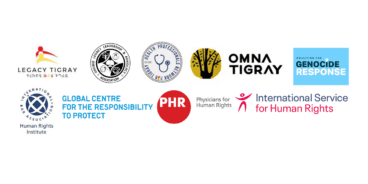

Atrocity Alert No. 276: Sudan, Yemen and Ethiopia
Atrocity Alert is a weekly publication by the Global Centre for the Responsibility to Protect highlighting situations where populations are at risk of, or are enduring, mass atrocity crimes.
MILITARY SEIZES POWER IN SUDAN AMIDST LARGE-SCALE PROTESTS
On Monday, 25 October, the military in Sudan seized power, detaining Prime Minister Abdalla Hamdok and other civilian leaders in an ongoing coup. This is the second coup attempt since 21 September. General Abdel Fattah al-Burhan, head of the joint civilian-military Sovereign Council that is responsible for Sudan’s transition to democracy, dissolved the transitional body and announced a state of emergency. General Burhan justified the coup by asserting that increasing tensions between the military and civilians were pushing the country towards civil war. He also asserted the military’s intention to remain committed to the democratic and political transition, with elections scheduled for July 2023.
Sudan’s transitional authorities came to power after country-wide protests brought an end to then President Omar al-Bashir’s thirty-year rule in April 2019. While Sudan’s political transition remained fragile, the military’s takeover threatens the considerable progress that transitional authorities have made with economic, political and institutional reforms. Michelle Bachelet, UN High Commissioner for Human Rights, warned that it would be “disastrous if Sudan goes backwards after finally bringing an end to decades of repressive dictatorship.”
Thousands of protesters have demonstrated across the country, demanding the reinstatement of the civilian-led government. At least seven people have reportedly been killed and more than 140 injured by security forces during the protests so far. Reports indicate the heavy presence of security forces, most from the Sudan Armed Forces and the Rapid Support Forces (RSF), patrolling parts of the capital, Khartoum, and allegedly arresting local protest organizers. The RSF and other security forces in Sudan have a long record of abuses and atrocities, including during protests. The military leaders who orchestrated Monday’s coup also ordered the RSF to attack protesters on 3 June 2019 at a sit-in outside the army’s headquarters, killing at least 100 people and injuring hundreds of others.
UN Secretary-General António Guterres called upon all Sudanese stakeholders to “immediately return to dialogue, and engage in good faith to restore the constitutional order and Sudan’s transitional process.” Security forces should protect the fundamental right to peaceful assembly and refrain from using excessive and deadly force against protesters. Sudan’s military and political leaders must prioritize human rights and the protection of civilians in any discussion regarding the country’s future. Savita Pawnday, Executive Director of the Global Centre for the Responsibility to Protect, said that, “the international community should unequivocally stand with the people of Sudan by calling for a credible political transition that respects the people’s desire for democratic reform.”
10,000+ CHILDREN KILLED OR MAIMED IN YEMEN’S SEVEN-YEAR CONFLICT
More than 10,000 children – approximately four children per day – have been killed or maimed since the conflict in Yemen began in March 2015, the UN Children’s Fund (UNICEF) said on 19 October. The alarming casualty figure represents a “tragic convergence” of four major threats, including protracted conflict, economic devastation, social services on the brink of collapse and a critically underfunded UN system. James Elder, UNICEF Spokesperson, emphasized that, “Yemen is the most difficult place in the world to be a child. And, incredulously, it is getting worse.”
Over 1,500 civilians have been killed or maimed in Yemen so far this year, including 70 children since July alone. Amidst a Houthi offensive in Marib, indiscriminate missiles have regularly targeted civilian objects, causing civilian casualties and large-scale displacement. According to the UN Secretary-General’s most recent report on children and armed conflict in Yemen, over 3,500 children suffered 8,526 instances of grave violations in 2019 and 2020, including denial of humanitarian access, killing and maiming, and recruitment and use in hostilities.
The conflict has also generated the world’s worst humanitarian crisis. The Group of Eminent Experts on Yemen, whose mandate was terminated by the UN Human Rights Council earlier this month, regularly reported that parties to the conflict have likely used starvation of civilians as a military tactic. Mr. Elder highlighted that, “children in Yemen are not starving because of a lack of food…They are starving because adults continue to wage a war in which children are the biggest losers.” According to UNICEF, more than 11 million children are in need of humanitarian assistance in Yemen, including 400,000 children suffering from severe acute malnutrition.
In a press statement on 20 October the UN Security Council (UNSC) condemned violations of International Humanitarian Law and violations and abuses of human rights and demanded an immediate ceasefire by all parties to the conflict. The UNSC should take steps towards ensuring accountability and issue targeted sanctions against any party responsible for likely war crimes and crimes against humanity, including the killing and maiming of children. All parties to the conflict should heed the Council’s call for de-escalation and commit to an inclusive dialogue to negotiate a political solution to the crisis.
MILLIONS THREATENED IN NORTHERN ETHIOPIA BY AIRSTRIKES AND ESCALATING CONFLICT
Since 18 October at least three children have been killed and dozens wounded in an airstrike campaign in Ethiopia’s Tigray region. The airstrikes, conducted by the Ethiopian federal government, were said to be targeting weapons, training and communications facilities utilized by Tigrayan forces. However, witnesses reported that at least one airstrike hit an area close to Mekelle University in the capital of Tigray. On 22 October an airstrike forced a scheduled UN humanitarian flight to abandon its landing in Mekelle. Following this incident, the UN suspended all of its humanitarian flights into Tigray.
The airstrikes are the latest escalation of the conflict in northern Ethiopia in which all parties have been accused of serious violations of international humanitarian and human rights law, some of which may amount to war crimes and crimes against humanity.
After nearly a year of conflict in Tigray, the region’s 6 million people have been left with little to no access to aid due to what the UN calls a “de facto humanitarian blockade,” increasing the risk of widespread famine and mass starvation. According to the UN Office for the Coordination of Humanitarian Affairs, between 7-13 October food reached only 52,000 people, one percent of those targeted for aid in Tigray. Fuel has also been barred from entering Tigray for more than two months, rendering travel difficult for many aid agencies.
Meanwhile, civilians continue to bear the brunt of ongoing fighting in the Amhara and Afar regions, neighboring Tigray. The federal government launched an offensive in Amhara and Afar earlier this month in an attempt to retake territory from Tigrayan forces. Over 840,000 people have been displaced since July while an estimated 1.7 million need emergency food assistance.
As the conflict approaches the one-year mark on 4 November, it is clear that there is no military solution to the political crisis. Sarah Hunter, Communications and Digital Media Officer at the Global Centre for the Responsibility to Protect, said that, “the international community must raise the cost of the conflict in northern Ethiopia and support mediation efforts by regional actors like the African Union. The ongoing commission of war crimes and crimes against humanity against civilians must end.”
Related Content


